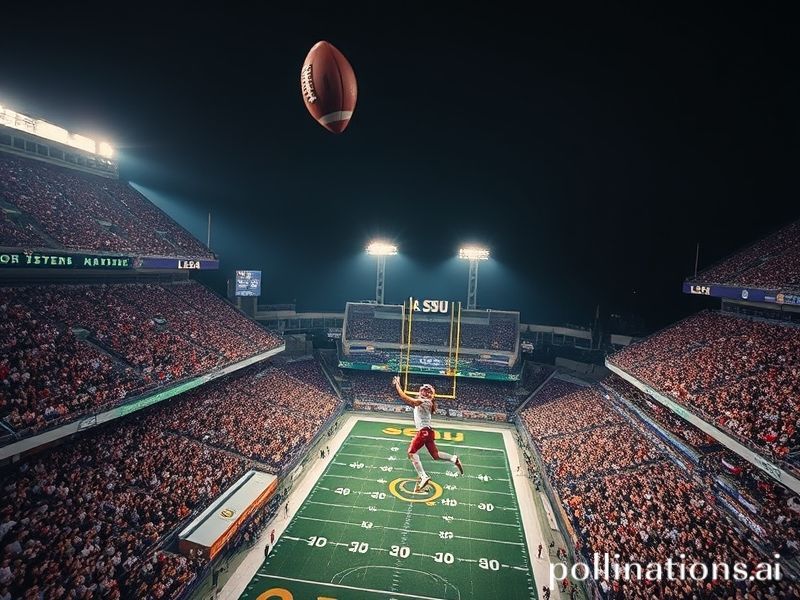SE LA vs LSU: How a Louisiana Football Rivalry Explains the World’s Inequality in 60 Minutes of Play-Action
São Paulo, Brazil – Somewhere on the other side of the equator and most of the civilized world’s attention span, the letters “SE LA” and “LSU” are being hurled at one another like undercooked empanadas in a family WhatsApp group. To the uninitiated, it sounds like the latest cryptocurrency rug-pull. To the initiated—mostly residents of Louisiana and a smattering of expatriates who once dated a Cajun—it is the annual collision between Southeastern Louisiana University and Louisiana State University, a gridiron pageant that, on paper, matters only to the 4.6 million Louisianans who can still afford electricity.
But look closer. While the rest of the planet frets about glaciers retiring early and A.I. replacing the last poets, two groups of unpaid semi-professors in plastic armor are engaging in what may be the most honest form of diplomacy left: ritualized violence with halftime commentary. The SE LA vs LSU fixture is not merely a football game; it is a microcosm of international class struggle, only with better marching-band arrangements.
Consider the geopolitics. LSU—founded 1860, enrollment 35,000, budget roughly the GDP of Tonga—represents the entrenched hegemon. SE LA—founded 1925, enrollment 14,000, budget roughly the GDP of Tonga’s parking meters—plays the plucky, under-resourced insurgent. One side arrives in chartered buses with Wi-Fi and personal branding consultants; the other shares a bus with the biology department’s fetal-pig delivery. Watching them line up is like seeing the United States play itself in a particularly cruel UN simulation.
Meanwhile, the global audience that does tune in does so by accident, usually via a sketchy Reddit stream that buffers every time someone in Minsk exhales. The chat sidebar scrolls in seven languages, all asking the same question: “Why does the scoreboard say ‘Tigers’ twice?” We are reminded, not for the first time, that cultural translation is a myth invented by lonely anthropologists.
Off the field, the implications ripple outward like cheap bourbon. Louisiana exports roughly $63 billion in goods annually—mostly chemicals, soybeans, and the faint hope that New Orleans might one day fix its potholes. Each televised snap between SE LA and LSU is therefore a 3.5-second commercial for a state whose coastline is disappearing faster than its residents’ flood insurance. The international viewer may not buy soybeans, but they will remember the slow-motion drone shot of a stadium that looks suspiciously like a beached aircraft carrier. Branding, darling, branding.
Then there is the money. LSU’s coach earns $10 million a year—coincidentally the same amount the World Food Programme requested last week for famine relief in the Horn of Africa. SE LA’s coach earns $350,000 and the occasional crawfish étouffée. Somewhere in Davos, a panel on income inequality just self-combusted.
And yet, for all the absurdity, the game offers a rare commodity in our fragmented age: shared delusion. Russians hacking elections, Chinese fishing fleets strip-mining the Atlantic, Europeans arguing over which cheese is most racist—none of it matters for three hours on a Saturday night in Baton Rouge. The planet may be on fire, but inside Tiger Stadium, 102,000 people agree that a 19-year-old backup punter is the most important human alive. If that isn’t a diplomatic breakthrough, what is?
As the final whistle blows and LSU wins by five touchdowns (spoiler: they always do), the victors prance, the vanquished console themselves with drive-thru daiquiris, and the rest of us return to our respective apocalypses. Somewhere in Lagos, a data analyst toggles off the stream, mildly disappointed that no actual tigers were involved. He’ll forget the score by breakfast, but he’ll remember the sound—an ecstatic, throaty roar that, for one brief moment, drowned out the planet’s collective anxiety. In the ledger of human folly, that counts as a win.







